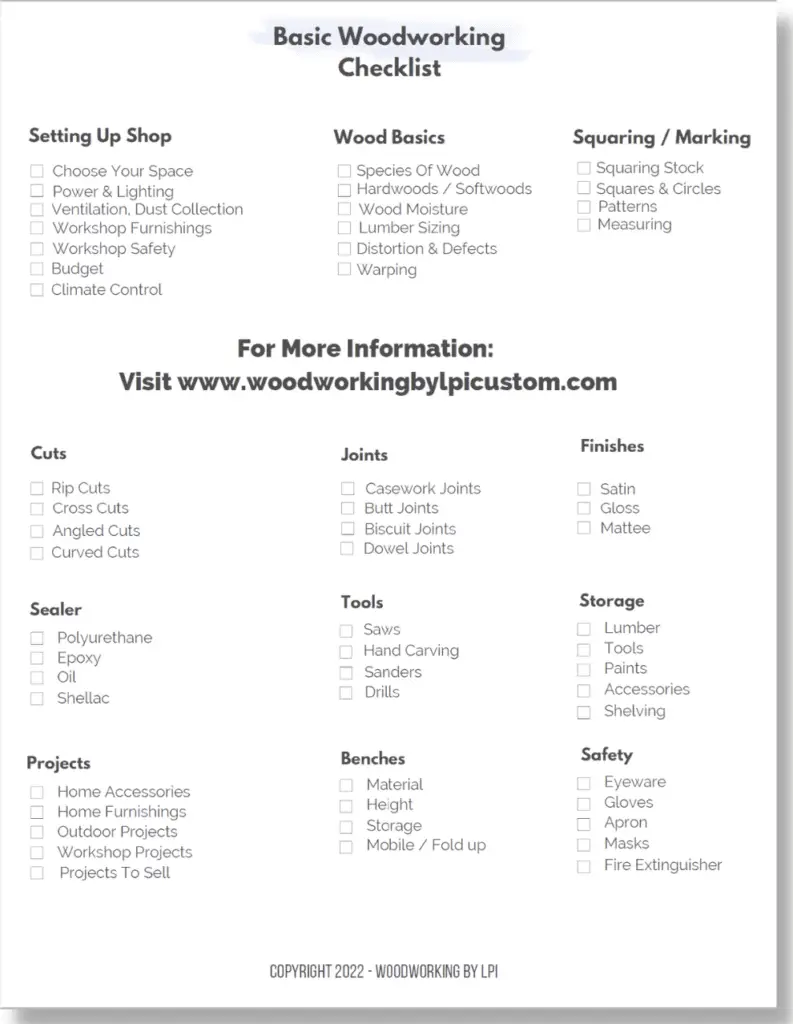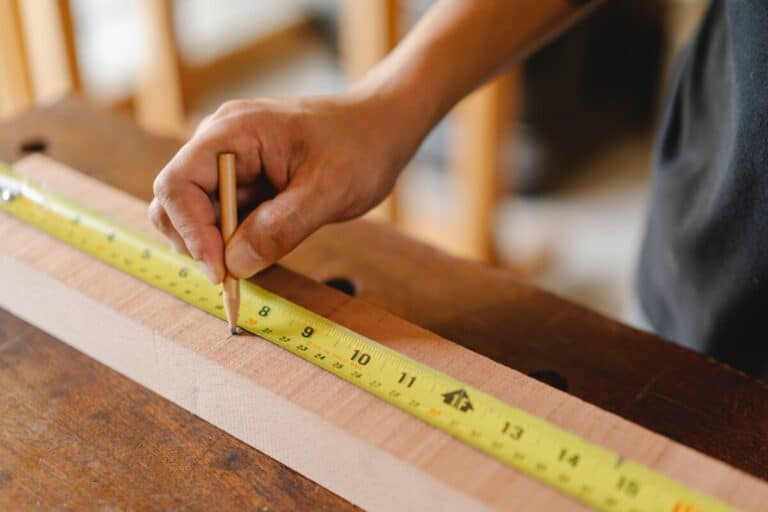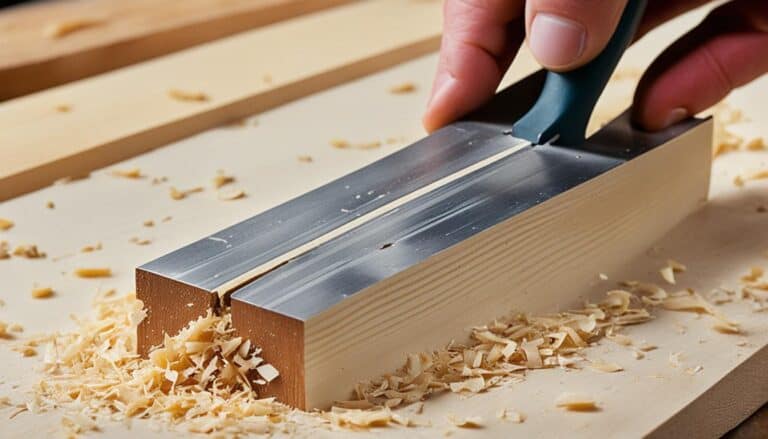Woodshop air compressors can be the most important tool you have in your woodshop. They have many uses and can be invaluable for many steps in the woodworking process. What air compressor do you choose and how do you maintain the air compressor to get the most use and years out of your woodshop air compressor.
Maintaining your air compressor in your woodshop is critical. Ensure you inspect values, airlines and if applicable oil and filters. Additionally, you will want to drain the moisture in your tank regularly as it will cause rust and eventually cause your air compressor to not work properly.
As mentioned an air compressor can be the lifeblood of your woodworking business and generally, air compressors are an expensive investment. I wanted to get into how to maintain your air compressor but I also wanted to ensure you know all the basics of a general air compressor to help you evaluate yours, or a possible purchase if you are considering one and maintain your air compressor properly.
So let’s get into an air compressor, what it can do to you, and keep it going for years to come benefiting your woodworking business.
What Is An Air Compressor

According to Wikipedia – “An air compressor is a device that converts power (using an electric motor, diesel or gasoline engine, etc.) into potential energy stored in pressurized air (i.e., compressed air). By one of several methods, an air compressor forces more and more air into a storage tank, increasing the pressure.”
It is important to note there are many different types of air compressors for your woodworking business whether your woodshop is a small or large woodshop. Depending on the size of your woodworking business and your needs you will need to get an air compressor to fit those needs.
Air compressors are categorized into two different types of internal mechanisms, they are positive displacement or dynamic displacement. Of these there are four common types of air compressors they are:
- Rotary Screw Compressor
- Reciprocating Air Compressor
- Axial Compressor
- Centrifugal Compressor
Different Types Of Air Compressors

Positive Displacement Air Compressors
Positive Displacement Air compressors with this category work with many different types of internal mechanisms however, the principle for each is identical. This is where a chamber inside the machine stores the air pulled in from outside, and then slowly compresses the chamber to increase the air pressure and potential energy.
A typical example of displacement compressors, rotary screw compressors, are the easiest types of air compressors to take care of, as they have and are equipped with an internal cooling system that doesn’t require much maintenance. They are commonly large, industrial-sized air compressors which can be either lubricated with oil or run oil-free.
Reciprocating Compressors
Another category of displacement compressors is the reciprocating compressor. Generally, these are found in your smaller wood shops such as garages and home construction projects. Contrary to the rotary screw compressor, a reciprocating compressor was not created for continuous use. A reciprocating air compressor generally will have more moving parts in comparison to a rotary screw compressor, and these will need to be lubricated with oil for better movement continually from a maintenance perspective.
The reciprocating compressor provides air pressure by way of a piston inside a cylinder, which compresses and moves the air to build up pressure. They are available in single or multi-stage variations, which will affect the pressure ranges they will provide.
So how do I chose the best air compressor for my woodshop? Generally, you need to look at your budget and what you will be using the air compressor for. Consider also the below:
- Oil Free
- Variable Speed
- Portability
These are the primary considerations for your woodshop and the woodworking projects you will be into. There are a lot of products on the market so what are the benefits of an air compressor for your woodshop.
Benefits Of Air Compressor For Wood Shop

Air Compressors are categorized approximately by the size of their tank (or multiple tanks). This coupled with the horsepower motor helps determine what tools the compressor can operate. These amazing tools include pneumatic nail guns, framing guns, and even pneumatic sanders to mention a few. Additionally, there are other tools, specifically, spray guns and sanders which need a lot more air and may overtake a compressor that’s too small.
To best help determine what air compressor you will need let’s look at some common tools and the air requirements.
| Tool | psi |
|---|---|
| Framing Nailer | 100-120 |
| Finish Nailer | 70-120 |
| Brad Nailer | 60-100 |
| Roofing Nailer | 90-100 |
| Pneumatic Stapler | 100-120 |
| Pneumatic Sander | 90-100 |
Air compressors help you in more ways than you can count. It doesn’t have an electrical connection, has a lot of power, and is generally safer. The range of pneumatic tools is vast and always growing. Depending on your woodworking projects and wood shop you will definitely want an air compressor to save you time and effort.
When considering your air compressor the minimum horsepower should be 1/2 and the minimum psi output should be 90. If you stick with those numbers you will have the capacity to operate the majority of the tools you will want to use for your woodworking projects.
Best DeWalt Air Compressor For Small Woodworking Shop
Now that we know more about what an air compressor is, some of the options you will need to consider are the air compressors I recommend.
I have been using DeWalt air compressors for about 15 years and can tell you they are invaluable. Not only from the tool perspective but just having a generic attachment to blow clean wood boards for wood signs and to clear off the workbench.
I have used several different brands and highly recommend the Dewalt brand as I have had the best success and longevity with them. In my mind, it came down to if I’m relying heavily on my air compressor I need one I can depend on.
I recommend two different for a fairly small woodshop. They are fairly inexpensive and will provide you years of service if maintained as mentioned below.
These DeWalt Air Compressors are space savers and will not get in your way but perform extremely well with low noise and the ability to putting on a shelf. Additionally, they are portable which is very important if you have a small woodshop and need to consolidate space when you are not using your shop.
e reviews for your purchase consideration you can visit amazon here.
How To Maintain An Air Compressor
Maintenance of your air compressor is crucial to longevity and correct operation. Simple steps can save you lots of money and keep your air compressor working efficiently and provide use of your pneumatic tools for a long time to come.
Here are some common considerations and questions you need to consider once you have your air compressor in your woodshop.
How do I maintain my air compressor tank?
I have included a video for you to view as it explains the maintenance very well.
How often should an air compressor be serviced?
Typically an Air compressor should serviced every 12 months. However, is most often based on hours. You need to service at approximately 3,000 hours. Typically considering standard use daily this comes out to be about every 6 and 9-month intervals. (Consult your manufacture documents for specifics on your model)
How often should you change air compressor oil?
Your need for an oil change in an air compressor will depend on the type of air compressor (ensure you check your manufacture information). However, at the very least (Unless you have an oil-free air compressor), you need to change the oil at least once a year.
Should you leave an air compressor pressurized?
Generally no you would not leave pressurized. Depending on your use of the air compressor if is recommended you don’t leave pressurized and drain the tank of any moisture after each use. This will help prevent any corrosion which may build in your tank which will impact the performance of your air compressor.
I have included a video for you to view as it explains the maintenance very well.
How do I maintain my oil free air compressor?
Check the air compressor safety valve
- Run the air compressor it until it reaches shut-off pressure.
- Locate and pull out on the safety valve ring to release pressure from the air tank completely (Check the air pressure gauge for air pressure amount).
- The safety relief valve should close automatically by itself. If the safety valve doesn’t close automatically, or if it doesn’t allow the release of air when you pull it out, replace the check valve.
Drain the air compressor tank
Typically the air pulled into the air tank on your air compressor contains water vapor that condenses like rain inside the tank. Ensure you drain the tank of water after every use or as much as possible depending on use. The drain valve is typically located underneath the tank at the very bottom. Be sure you open the drain valve all the way and allow the tank to drain completely.
Check the air compressor air filter
Depending on the model and manufacture the location of the air filter varies (or may not have one at all). However most often it’s located underneath the plastic housing around the head–check your owner’s manual for your exact location.
How Long Does An Air Compressor Last
I have been asked this question many times and it depends on several factors. The old expression of if you take of it, it will take of you rings true here.
Things to consider when you think about the longevity of your air compressor are your location, amount of use, and what you will be using your air compressor for.
Location Of Your Air Compressor
Where you live and where you place the air compressor in your woodshop or garage will have an impact on your maintenance schedule. If you live in a very warm climate with a lot of humidity you may consider draining your air tank a little more frequently.
Not draining your air tank will cause the tank to corrode over time and affect the performance of the air compressor as well as a potential crack to form in the tank allowing air pressure to escape.
Amount Of Use
The amount of use of your air compressor will of course increase your maintenance. If you are using your air compressor daily you may want to have a checklist next to the compressor to verify you have drained the compressor air tank and checked any connections and/or belts if applicable.
However, if you are not using your air compressor daily you will want to adjust your maintenance and/or checklist accordingly. It is critical to your workshop to ensure your air compressor is working at peak performance.
What Will You Be Using Your Air Compressor For
The reason I mention this subject is I don’t see it mentioned to much in my research for this post. It intrigued me I didn’t see it. It is important to note all the above is also very important.
However, it is also very important to note that what you do in your woodshop also impacts your air compressor. I’m specifically addressing things such as spraying any sealer or resin.
If you would like to see more information about sealing your wood signs or wood projects you can see my other article here.
A lot of your air compressors come with a filter and some don’t. The closer your air compressor is to your work area where you will be spraying the more the sealer or resin will get on your air compressor and clog it up or impact the performance.
If you are going to be using your air compressor for spraying sealer or resin you may want to consider locating your air compressor a distance away and ensure you have a fan or ventilation plan. I have lost one air compressor to this subject. Since moving my air compressor a good distance away I have had no issues with any sealer or resin getting on my air compressor. Food for thought.
Conclusion
Maintenance on your air compressor will increase the number of years and give you the best performance. So are there general guidelines? As mentioned above in the maintenance section if you perform a little maintenance your air compressor will perform for many years to come.












